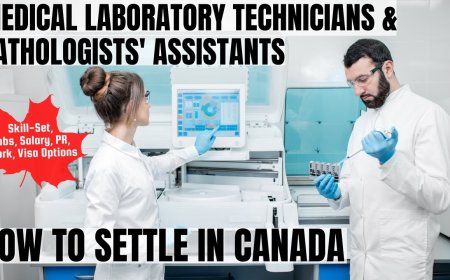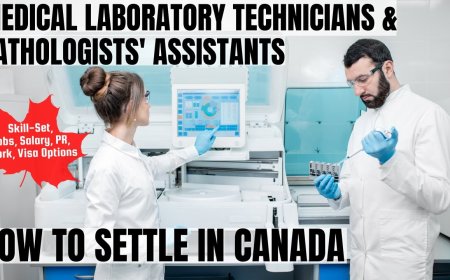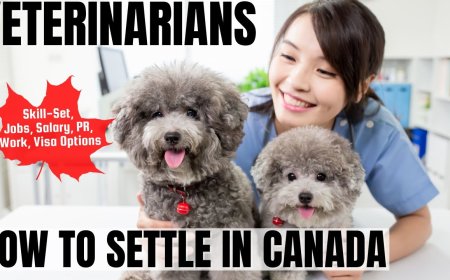Animal health technologists and veterinary technicians Canada Immigration Pathways: Understanding Salaries, Work Roles, and Best Provinces
Welcome to the pathway to Canada immigration for skilled professionals and trade workers. This guide is specifically tailored for Animal health technologists and veterinary technicians looking to work and settle in Canada, offering a deep dive into the essential aspects of immigration and employment in this field.
Introduction
Animal health technologists and veterinary technicians play a crucial role in the healthcare and well-being of animals, providing support to veterinarians and ensuring the proper care and treatment of animals. In this article, we will explore the career and immigration prospects in Canada for individuals in this profession, with a focus on the National Occupation Classification code NOC 3213. We will discuss the profile description, main job duties, education and licence requirements, skills needed, median salaries, possible visa options, and more for animal health technologists and veterinary technicians in Canada. Whether you are a Canadian resident looking to pursue a career in this field or an international professional interested in immigrating to Canada, this article will provide valuable insights and information to help you navigate your career path in the animal health industry.
What is the Profile Description of a Animal health technologists and veterinary technicians as per the Canadian National Occupation Classification (NOC) Standards?
Animal health technologists and veterinary technicians play a crucial role in supporting veterinarians in caring for animals and diagnosing and treating animal health issues. They work in a variety of settings such as veterinary clinics, animal hospitals, shelters, zoos, research laboratories, pharmaceutical companies, and government agencies. Supervisors in this field are also included in this group.
What are the Main Job Duties of a Animal health technologists and veterinary technicians in Canada?
- Provide nursing care, rehabilitation therapy, and wound care for animals
- Assist veterinarians with surgical procedures by preparing equipment, administering anaesthetics, and monitoring animals
- Perform diagnostic tests including radiographs and laboratory analysis to help diagnose animal health problems
- Administer medications, vaccines, and treatments as prescribed by a veterinarian
- Educate and advise clients on animal health care, including nutrition and home care
What are the Education, Certifications, and Licensing Requirements to Work as Animal health technologists and veterinary technicians in Canada?
To become an animal health technologist or veterinary technician, individuals must complete a two- or three-year animal health/veterinary technology college program. Additionally, passing a national registration examination may be necessary in certain job environments. It is also important to be registered with provincial animal health technologists' or veterinary technicians' associations, as this is mandatory in some provinces.
What Essential Skills are Required for Animal health technologists and veterinary technicians to succeed in Canada?
Animal health technologists and veterinary technicians must possess a variety of essential skills in order to be successful in their profession. These professionals are responsible for handling, restraining, and caring for animals undergoing treatment and surgery, as well as assisting veterinarians before, during, and after these procedures. They also prepare and administer medications and vaccines, administer treatments prescribed by veterinarians, and conduct specialized procedures such as animal identification and hoof trimming. Animal health technologists and veterinary technicians are also involved in counseling clients on animal health care, conducting laboratory research, producing diagnostic radiographs, and performing other laboratory tests. Additionally, they must have skills in veterinary office management, providing nursing care and rehabilitation therapy for animals, performing routine animal dental procedures, assisting with animal dentistry, and providing wound and bandage care. Overall, a successful animal health technologist or veterinary technician must have a strong foundation in skills related to animal care, medical procedures, laboratory work, and client communication.
What is the Median Age and Retirement Age for Animal health technologists and veterinary technicians in Canada?
The skilled professionals working as animal health technologists and veterinary technicians have a median age of 31.0 years, indicating that a significant portion of the workforce is relatively young. Despite this, the average retirement age for individuals in this field is 62.0 years, suggesting that many professionals choose to stay in the industry for a significant portion of their careers. This trend could be due to the passion and dedication individuals have for caring for animals, as well as the opportunities for career growth and skill development within the field. Overall, it is evident that individuals in this profession have a long and fulfilling career ahead of them.
How many job openings exist for Other Animal health technologists and veterinary technicians in Canada, and what's their provincial distribution?
In Canada, there are a total of 115 job openings for the position of Animal health technologists and veterinary technicians. The province with the highest number of job openings is Québec with 74 positions available, while British Columbia follows with 22 job openings. Ontario has 8 job openings, Saskatchewan and New Brunswick each have 4, and Alberta, Nova Scotia, and the Northwest Territories have 2 job openings each. The provinces with the maximum number of job openings are Québec and British Columbia, while provinces like Alberta and Nova Scotia have the minimum number of job openings. If you are looking to work in this field, Québec and British Columbia would be the ideal provinces to start your job search.
What is the hourly wage or salary of Animal health technologists and veterinary technicians in different Provinces of Canada?
According to the wage data for Animal health technologists and veterinary technicians in Canada, the highest wages are seen in Manitoba, where the high wage is $38.00, followed by Saskatchewan with a high wage of $35.00. On the other hand, the lowest high wage is in Newfoundland and Labrador at $21.24. In terms of median wages, Alberta leads with $23.00, while New Brunswick has the lowest median wage at $15.00. Interestingly, Saskatchewan also has the highest low wage at $17.00, while Prince Edward Island has the lowest low wage at $14.00. Overall, the wage analysis suggests that there is a significant variation in wages for Animal health technologists and veterinary technicians across provinces in Canada, with Manitoba and Alberta offering the highest earning potential.
What are the various visa options available for Animal health technologists and veterinary technicians migrating to Canada?
Animal health technologists and veterinary technicians are currently in high demand in Canada and are eligible for Category based Express Entry Invitation draws for Canadian PR under the Healthcare Occupations Category. Express Entry is a system used to manage applications for permanent residency for skilled workers. Additionally, they can also apply through Provincial Nominee Programs or secure Employer Sponsored Work Visas. Other visa options may also be available for this profile. To learn more about the various migration options and discuss your eligibility, book an appointment with our professionals today.
Have Questions or Need Assistance?
If you have any queries or require assistance with your immigration plans, we're here to help. Our experienced immigration consultants are ready to provide personalized guidance tailored to your specific needs.
Don't hesitate to reach out and schedule an appointment today. Whether you're seeking clarification on immigration processes, exploring visa options, or need support with documentation, we're dedicated to assisting you every step of the way.
Book an appointment with our team to discuss your immigration goals and receive expert guidance for your journey to Canada.
What's Your Reaction?
 Like
0
Like
0
 Dislike
0
Dislike
0
 Love
0
Love
0
 Funny
0
Funny
0
 Angry
0
Angry
0
 Sad
0
Sad
0
 Wow
0
Wow
0






































































